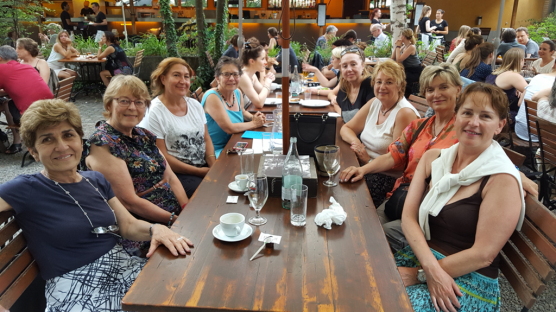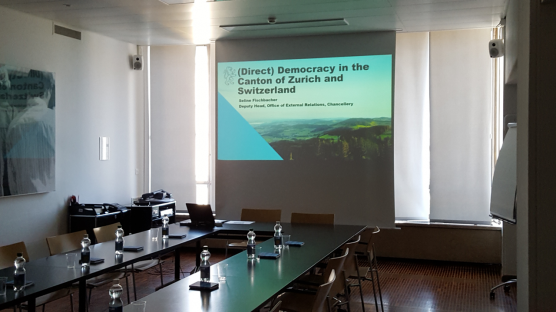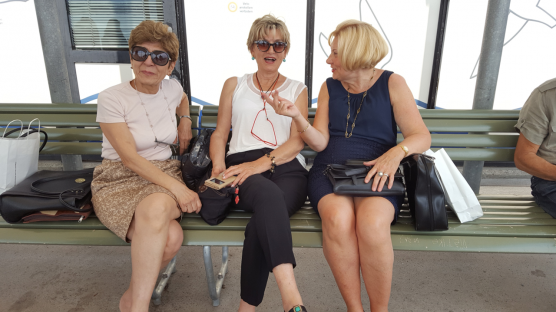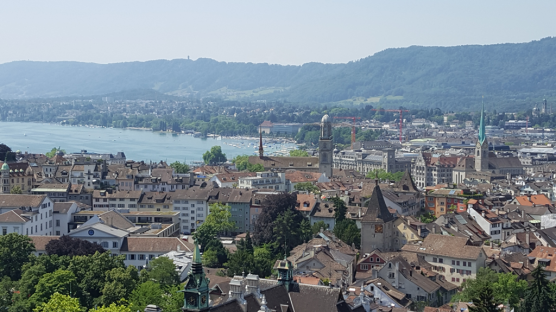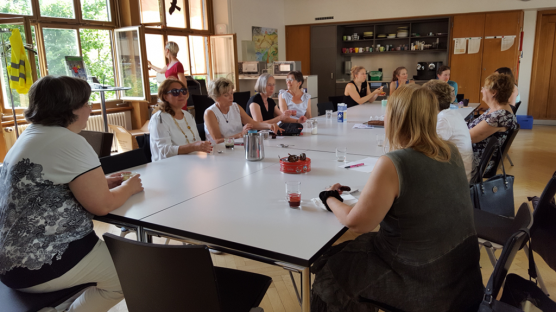International Meeting in Zurich between the Turkish Association of University Women (TAUW) and the Swiss Association of University Women (SVA). Programme 20 – 24 June 2017
The idea of this meeting all started at the Cape Town Conference in 2016, at an informal dinner between delegates from the Turkish and Swiss NFAs. Why not organize an event between our two associations that would focus on the educational, social and constitutional models of our countries? Two weeks later we receive an initiative of suggestions from our Turkish Association, and the planning begins. Dr. Karoline Dorsch, President of the Zurich Association and SVA CIR drives the tasks and organization at hand, together with Prof. Katharina Strub, GWI Treasurer and Sheila Buemi-Moore, Member of the Commission for International Relations (both from Geneva) and on 20 June 2017 we are delighted to greet the members of the Turkish Association:
Prof. Gaye ERBATUR, TAUW President
Gülen CETIN, TAUW Vice President
Perihan TÜLÜCE, TAUW Secretary of the Board
Dr. Serap MAKTAV, TAUW CIR
Prof. Dr. Gönül BALKIR, TAUW Executive Board member
Day 1
Our hosts arrive and are greeted at the airport by Karoline Dorsch. A walking tour of the city in the afternoon shows different landmarks and finishes at Reithalle, in the garden restaurant. Katharina Strub and Sheila Buemi-Moore, greet them in the early evening for the welcome reception.
Day 2
Our programme for the day was busy. In the morning our SVA President, Doris Boscardin, joined us with members Elsbeth von Navarini (former GWI Treasuerer, from the Grisons Section), Verena Müller and Andrea Linsmayer (both from Zurich). We were received by Seline Fischbacher, Deputy Head of the Office of External Relations at the State Chancellery of Zurich. Our purpose was to provide a presentation on Swiss democracy, one of the oldest direct democracies in Europe promoting federalism. Seline Fischbacher underlined the importance of how democracy and federalism work together in Switzerland. She presented the three levels of the Confederation, comprised of federal, cantonal and communal powers. The first Swiss Constitution was promulgated in 1848 and was based on the American model. It was important for the cantons (states) to retain their sovereignty and to maintain and promote diversity, multilingualism and the protection of minorities within the country. Revisions either partial or total were introduced progressively. It was not until 1971 that equal rights for women were introduced at a Federal level.
The Swiss model of government underlines the importance of consensus and integration rather than opposition. The Federal Council is represented by a college of 7 members, each of which heads a government department. The Federal Council is elected by the two parliamentary chambers and their tasks are laid out in the Federal Constitution.
What is the proportion of women in Swiss Parliament? In 2015 women represented 32% of its 200 members in the National Council and 7 out of 46 in the Council of State. In 2010 women reached a majority in the Federal Council, obtaining 4 out of 7 seats.
In Turkey, the proportion of women in Parliament represents 14% in spite of the introduction of full universal suffrage in 1934, well before that of Switzerland.
Our delegation was then greeted by the Office for Gender Equality of the Canton of Zurich, a branch of the Department of Justice and Home Affairs. Alexandra Imbach and Yannick Staubli presented their mandate to eliminate discrimination as well as other projects and activities focusing on the social and economic inclusion of diversity. One of their studies highlighted the impact of gender stereotypes: when seeking employment, 75% of men choose from 31 different jobs whereas 75% of women choose from 14 different jobs.
To manage and change the perception of gender roles, Alexandra Imbach and Yannick Staubli are working at all age levels. They have introduced amusing activities through a game called “Job Matcher” that defies classic stereotype thinking by highlighting society’s tendencies to associate women to care giving roles and men to technical ones. This game surprises in a playful way that gender should not be the criteria to choose a profession. This has been introduced at primary schools and workshops are organized at secondary schools as well as within professional circles. Other workshops focus on “work-life balance”. The canton of Zurich is an important employer of the country and studies of the employment market have shown that in the working situation an 18% wage difference between men and women exists. Factors such as education, experience, hierarchy and seniority can meet objective criteria to explain this difference. However, 8.7% cannot be explained using the same measured criteria for the same function. Gender still plays an important role at the work place. Service is offered to NGOs and firms in the private sector and some of the latter sign charters to reduce the wage gap. The pillars of equality promoted are:
1) Choice of profession
2) Work-Life Balance
3) Equal Salary, and
4) other factors such as individual and institutional counselling against discrimination and sexual harassment, speeches, diversity and inclusion events.
Our meeting ends with an invitation to a lunch cruise on Lake Zurich.
After a stroll through the old town we headed towardsthe Municipal Council, the Parliament of the City of Zurich. We were able to follow a busy session of Parliament from the grandstand. The Council is elected every four years by the voters of the City of Zurich.
In spite of the long day and very warm weather Verena Müller, a historian and expert of women’s history, treated us to a lovely tour explaining the surrounding landmarks, archaeological remnants of former Roman baths along with historical anecdotes on some of Zurich’s famous and historical figures.
Day 2
University of Zurich (UZH): Diversity and Equality at UZH, Office of Gender Equality.
The objective is to reach equality of women and men to ensure a balanced representation of both sexes in all university functions be it research, teaching and/or administration. Dr. Christiane Löwe, Head of the Office for Gender Equality, promotes and manages opportunities to reach these goals. Tanja Neve-Seyfarth who works for the Office of Gender Equality provided a first presentation on Academic Career Development and Life Balance at UZH which explained the legal basis, facts and figures and the priority topics to manage and change such as unconscious bias. In December 2016, a study at the university showed that 79% of professors were men while only 21% were women whereas the positions of assistant professors showed 22% of men and 78% of women. Problems clearly begin at the post doctorate level and up. There is a Code of Conduct on Gender Policy to support the implementation of objectives to counsel and support in the areas of child care, part-time employment and provide equal opportunity tool kits. Funding levels for research are now under study to provide for new opportunities and academic careers. Of course, the issues often voiced centre on Life Balance obstacles. The current working models are not conducive to parenthood.
Dr. Löwe provided a presentation on the University of Zurich and the importance to define priorities towards structural and not just cultural and unconscious bias. UZH was founded in 1833 and the first woman to hold a PhD in medicine was in 1864. Today the university has 57.01% female students. Progress of female professors is slow but increasing. She discussed the UZH Gender Equality Action Plan 2013 – 2016 indicating measures to reach goals for more women in positions of professorship or leadership roles. The new Action Plan 2017 – 2020 has three main projects:
Project 1: Open, transparent and merit-based recruitment of researchers
Project 2: Research funding and academic careers
Project 3: New organisational models for part-time management positions at UZH.
What are some other measures needed to do to gain more global influence? Show best practices between universities (statistics) and introduce day care centres. On a legal basis, the Charta document lays down the recognition and need to reach compatibility between family responsibilities and academia.
Dr. Christiane Löwe invited us to the tower of the University which, in addition to a lovely lunch offered a beautiful view over the city, its lake and mountains.
Kunsthaus, Zurich, a cultural visit toone of Zurich’s major art museums offered an impressive collection with many Swiss artists such as Hodler, Segantini and Alberto Giacometti’s statues. Then of course the sheer delight to see the works of several masters such as Monet, Van Gogh, Degas, Cézanne, Picasso, Dali and Magritte.
A short stroll through the gardens of Villa Tobler located in the old town revealed a dragon fountain with a gold coloured mosaic. Just next to this Villa was our final meeting for the day.
Meeting with members of the Zurich branch and other branches of Switzerland.
Participants: Dr. Maria Bühler, Dr. Karoline Dorsch-Häsler, Prof. Doris Edel, Lisa Hierlemann-Aebi, Andrea Linsmayer, Dr. Claudia De Morsier, Prof. Ana Celia Mota, Verena Müller, Angelika Spanke, all from Zurich; Prof. Sheila Buemi-Moore and Katharina Strub from Geneva.
Susan A. Peter introduced the meeting with her presentation “A day in the life of the Zurich Violetta Women’s Refuge”. Susan A. Peter is manager of the Foundation of Zurich Women’s Shelter (Violetta Haus) founded in 1980. It is a crisis intervention centre that fights against domestic violence and human trafficking 24 hours a day, 365 days per year. Switzerland has 15 women shelters and all are financed through private funding. State-run women shelters do not exist nor does a State-wide strategy to combat violence. Development has nevertheless advanced by securing international agreements, such as the European Convention on Human Rights as well as developments within the Penal Code, Civil Code and other legislation in Zurich. Statistics from different sources such as the UN or the WHO publish reports showing that 35%, i.e. one of three women falls victim to physical violence in all social classes, nationalities and age groups. Unreported cases are still high but progress has been made to eliminate the taboos.
The shelter offers, inter alia, 24 beds, high security standards, psycho-social and juridical assistance and socio-pedagogical support for children.
The raison d’être of women’s shelters is multiple: escalation of violence, the abuser wasn’t seized, there is a threat that additional people might resort to violence, laws aren’t effective as protection, the hazard potential is high, the woman needs comprehensive support, forced marriage and human trafficking. The risk factors for women and their children include traumas, addictions, poverty, isolation, dominant behaviour, among others.
Most women stay on average 21 days. Three out of 5 are mothers with children usually between two to five years old. 35% of the women are Swiss and 65% are of other nationalities. Approximately one third return to the Women’s Shelter.
Once the women leave the centre they remain in contact and the centre continues its support. Depending on the situation at hand it may be social, psychological or legal.
The end goal for each person is to leave the shelter strengthened, resilient with a life free of violence. The effects of domestic violence can impair the ability for empathy and later on become an abuser. The damage costs are not only financial but also social. It is not violence that will improve situations but civic commitment and daring to resist.
Our next topic turns us to our own Associations – An Introduction on the work and functioning of TAUW and SVA.
Professor Gaye Erbatur, President of TAUW explained that TAUW was established in 1949 and has 24 branches comprising of a total of 1,100 members. Ataturk was the first President of the Republic of Turkey, a democratic, secular, parliamentary republic with a diverse cultural heritage. Our civil code is based on that of Switzerland. What are we doing to empower women?
Education is a tool against violence. The major obstacles women face in Turkey concern violence and lack of presence at decision-making levels. Child marriages also hinder education for about one third of girls under 17 years old. On the one hand women need to think big and not cut themselves back so that they fit their career into their family. On the other hand, society is not conducive to help fulfil their roles. Frequently women must rely on grandparents for child care during their studies. Either day care is too expensive or it does not exist. TAUW plays an active role promoting education for girls and women. Those women who are retired can support the cause and they are very helpful. Of course, younger members are needed. The President, who was first elected in 2014, investigated that the average age of members was 56.
Scholarships are promoted through TAUW for students not just on a pecuniary basis but also to develop friendship. Some branches raise funds for mentoring. When these students graduate, we ask them to mentor younger members. Other branches of TAUW promote human rights and with the current changes in government women are actively working to maintain and promote their rights. Turkey has changed its constitution and the impact on new legislation, human rights and the judicial system is not beneficial to women.
Joint project with the European Union: Our branches obtain project funding to enhance skills for women in different areas, be it jewellery, marketing or even opening a kindergarten. Our members are helping to train and encourage them.
On a human rights level, we are taking positions with other NGOs against governmental decisions so we are working actively for fear of losing our rights. Abortion laws are changing, honour crimes and murders of women are increasing. The judicial system has become worse as the President appoints all judges in the Supreme Court. This is new. There is a direct connection between women’s rights and modernity and development. It is important for women to remain active citizens and claim their rights through education.
Regarding university studies, it is interesting to note that in contrast to Europe, the academic studies women pursue in Turkey concentrate in the field of sciences.
Dr. Karoline Dorsch, President of the Zurich Association, explained that the SVA has about 650 members and 9 sections but its membership has aged considerably. The average age has been calculated at 70 years. The SVA’s main goal is to promote equality both academically and professionally. The Association participates in the Equal Pay Day initiative and this year’s special topic is women and STEM (Science, Technology, Engineering and Mathematics), aiming to encourage more women to study in these fields. It also develops its own fund raising to support projects aimed at the education of girls. Cultural meetings are appreciated as well as formal meetings organized by Graduate Women International (GWI), the University Women of Europe (UWE) and the annual informal DACH meeting of the German-speaking NFAs (Germany, Austria and CH).
The main concerns facing our associations point to membership and involvement. The Zurich Association has 120 members but only 20 to 30 members actively participate. We would want members to be more active but this is difficult given the age factor (most of them are grandmothers). We clearly need younger members and are working on that. Dr. Dorsch proposed to organize a brainstorming session on the issue.
Day 3
Visit of a primary school.
Our delegation was greeted by the Principal and teaching staff. The atmosphere was relaxed but busy. In Switzerland the educational system is a government responsibility, both cantonal and federal. School is compulsory for eleven years. The primary cycle lasts eight years, including two years of kindergarten and the lower secondary cycle lasts between three to four years. The post-compulsory education begins with gymnasium or vocational education and training apprenticeship which is an additional three to four years. The tertiary level of the Swiss educational system can be completed at universities or at higher professional or education training institutions.
At this primary school, the children first learn sounds and then how to read them. Each class holds roughly 20 pupils and 30% are foreigners. The school integrates special needs.
During a visit of the classrooms it was noticed that the pupils are often seated in circles and choose their own places. All children actively participate. The main issues teachers initially face are not gender specific but related to agitation. The gender roles become decisive around the age of eight or nine and work for improvement is essential but complex.
Final Dinner.
Dr. Karoline Dorsch invites our Turkish members to her home to relax or take a swim in Lake Zurich. A wonderful Turkish dinner was prepared, thanks to our Turkish members and a Turkish friend of theirs living in Zurich.
We finish our exchange in Switzerland on a positive note. Of course, we have already identified room for improvements but we encourage future meetings on an international level to develop cooperation and human rights that are seriously challenged in today’s rising violence.
On behalf of SVA it is with great pleasure to thank the TAUW delegation for their visit, to learn about their active work to eliminate discrimination and to contribute towards gender equality through education. We appreciated their reflexions and questions about the Swiss model and learned about theirs. Last but not least we express our appreciation of their unflagging, generous and treasured friendship.
Sheila Buemi-Moore
SVA Member of the Commission for International Relations
Istanbul – 31st Triennial Conference, 16–21 August 2013
Eine Delegation von 10 Mitgliedern des SVA, darunter 4 Delegierte, nahm an der alle drei Jahren stattfindenden Konferenz des IFUW in Istanbul teil. Als neue Weltpräsidentin wurde Catherine Bell aus Südafrika gewählt. Zu unserer grossen Freude sind wir neu im Vorstand des IFUW vertreten durch Elsbeth von Navarini, die als Kassiererin des IFUW gewählt wurde. Eine eminent wichtige Frage für die Verwaltung des in finanziellen Schwierigkeiten stehenden Verbandes, musste gelöst werden: die Versammlung entschied sich gegen ein «Outsourcing» und für die Weiterführung des personalisierten Büros in Genf.
Verena Welti, Präsidentin
Bericht aus Istanbul von Anita von Arx, Präsidentin der Kommission für internationale Beziehungen des SVA: PDF 298 KB
Workshop über die Vereinbarkeit von Familie und Beruf, Bericht von Verena Welti, Präsidentin: PDF 100 KB
Workshop des SVA in Istanbul: Zur Vereinbarkeit von Beruf und Familie
2010 wurde an der Versammlung des internationalen Verbandes IFUW in Mexico eine Resolution verabschiedet, die vom SVA vorgeschlagen worden war und ein aktuelles Problem von jungen Akademikerinnen betrifft. Als Vorbereitung der nächsten IFUW Konferenz in Istanbul 2013 wurde eine Umfrage in den 9 Sektionen des SVA gemacht. Die Resultate widerspiegeln lediglich die Wahrnehmung der Problematik in unserem Verband ohne Anspruch auf eine wissenschaftliche Untersuchung.
Die Zusammenfassung der von den Sektionen zusammengestellten Antworten oder der Links auf kantonale Informationen wurde von der Sekretärin des SVA, Livia Boscardin als Powerpoint-Präsentation erstellt. Wir danken ihr für die effiziente Arbeit (PDF 494 KB).
Verena Welti, Präsidentin
GWI Conference 2019
Bericht vom GWI-Meeting vom 25.-28.7.2019 in Genf
von Tatjana Betschart, CIR
Das GWI-Meeting mit Delegiertenversammlung, Konferenz und 100-Jahr-Feier ging vom 25.-28.7.2019 an der Uni Genf erfolgreich über die Bühne. Der öffentliche Konferenztag mit Vorträgen und Workshops stand unter dem Motto «Peace Through Education». Für die rund vierhundert Teilnehmerinnen aus über 50 Ländern war ein vielfältiges Programm zusammengestellt worden, so gab es neben der zweitägigen Generalversammlung für die Delegierten eine Centenary Celebration und die Swiss Culture Night. Alle diese Veranstaltungen boten reichlich Gelegenheit, mit Frauen aus allen fünf Kontinenten zu diskutieren, von Kanada über Mexico und Indien bis Neuseeland.
Die Generalversammlung wurde von Geeta Desai und ihren Kolleginnen des GWI Boards geleitet. Ihre Arbeit der letzten drei Jahre wurde herzlich verdankt. Zudem fanden die Wahlen in die Gremien des GWI für 2019 bis 2022 statt. Das Präsidium des GWI übernimmt neu Terry Oudraad, GWI Netherlands. Gewählt wurden auch die Vize-Präsidentinnen und die übrigen Mitglieder des Board of Officers. Der SVA ist im GWI Board mit Katharina Strub (Sektion Genf) als gewählte Treasurer und Karoline Dorsch (Sektion Zürich) als neu gewählte Assistant Treasurer sehr gut vertreten. Eine wichtige Information an der Versammlung war auch, dass der GWI nach finanziellen Schwierigkeiten wieder gut dasteht.
Als Gastland war die Schweiz ein Schwergewicht am Meeting. Doris Boscardin, Präsidentin des SVA und Vorsitzende des Local Arrangements Committee LAC, begrüsste die Teilnehmerinnen mit einer sehr gelungenen Rede. Die hervorragende Organisation des Events war grösstenteils der Organisationsarbeit des LAC zu verdanken. Anderthalb Jahre hatten Doris und Livia Boscardin, Karoline Dorsch, Stacy Dry Lara, Susanne Leber, Ruth Nieffer, Lilia Müggler und Katharina Strub an der Vorbereitung dieses Events gearbeitet.
Rund zwanzig Schweizerinnen aus verschiedenen Sektionen, davon mehrere aus Graubünden, waren als Volunteers während der Veranstaltung rund um die Uhr präsent und stellten den reibungsfreien Ablauf der Delegiertenversammlung, der Konferenz, der Feierlichkeiten und der Ausflüge sicher.
Dass dieses Meeting ein unvergesslicher Event wurde, können Sie vier Beiträgen von Mitgliedern der Sektion Graubünden entnehmen.
Bericht vom Einsatz der Volunteers am GWI-Meeting vom 25.-28.7.2019 in Genf
von Ruth Nieffer, Sektion GR
Das Gebäude der Uni Mail in Genf verfügt über einen imposanten Innenhof, hell und vom Sonnenlicht geflutet, das durch die Glasdecke eindringt. Von diesem Innenhof ausgehend gelangt frau in die verschiedenen Auditorien und Seminarräume. Dieser Ort war Treffpunkt der bis zu vierhundert Teilnehmerinnen am 33. GWI-Treffen, welches alle drei Jahre stattfindet. Zur Generalversammlung und Konferenz kam in Genf noch die Hundertjahrfeier des GWI dazu. Für uns freiwillige Helferinnen war die Uni Mail für vier Tage gleichermassen der Einsatzort.
Jeden Morgen gegen 8:30 Uhr trudelten die ersten Teilnehmerinnen ein, ihre beigen Taschen mit dem GWI-Logo unter den Arm geklemmt. Eine Stunde vorher hatten wir uns bereits in die Liste der anwesenden Volunteers eingetragen, dann den Informationstisch aufgebaut und Hinweistafeln angebracht. Wir – ein bunt gemischtes Trüppchen von Frauen aus verschiedenen Sektionen des SVA, ausgestattet mit einem weissen Schal als Erkennungszeichen und unserem Volunteer-Handbook.
Unsere zwei Hauptaufgaben waren, dafür zu sorgen, dass sich die Teilnehmerinnen zum einen rechtzeitig im richtigen Auditorium einfanden und zum anderen auf die vielfältigen Fragen rund um die Konferenz und das Rahmenprogramm Antworten zu finden. Während der Generalversammlung war ersteres nicht weiter schwierig, alle hatten sich im grössten Auditorium zu versammeln. Das dichte Workshop-Programm der «Peace through Education»-Konferenz forderte dann jedoch unseren Orientierungssinn. Da lohnte es sich zur eigenen Gewissheit, die auf drei Etagen verteilten Räumlichkeiten vorher zu erkunden.
Dreh- und Angelpunkt war jedoch unser Informationstisch am Eingang der Uni Mail. Unermüdlich beantworteten wir Fragen oder kümmerten uns um persönliche Belange der Teilnehmerinnen: von Hinweisen zum Programm oder wo sich Cafeteria und Toiletten befinden, hin zu Tipps für Sightseeing oder Auskünften zum öffentlichen Verkehr. Was einem Franken in der eigenen Währung entspricht und ob sich das Wetter für das Dinner auf dem Raddampfer wohl halten wird. Wie frau sich ins lokale WLAN einloggt; ob jemand die liegen gelassene Brille, das verlorene Handy wohl gefunden hat? Und so weiter.
Vier Tage babylonisches Sprachengewirr waren anstrengend, aber auch bereichernd, konnten wir doch zwischendurch am einen oder anderen Programmpunkt teilnehmen oder uns mit einzelnen Teilnehmerinnen über deren beruflichen Hintergrund sowie unsere kulturspezifischen Gemeinsamkeiten wie Unterschiede austauschen – nicht zuletzt auch mit unseren eigenen Verbandskolleginnen!
Nun ist der GWI-Anlass bereits passé, der Informationstisch weggeräumt, der weisse Schal im Schrank verstaut, das Volunteer-Handbook im Altpapier entsorgt. Was nachhallt, sind die herzlichen Begegnungen und die Dankbarkeit vieler Teilnehmerinnen, deren Besuch an der Uni Mail in Genf wir mit unserem Freiwilligeneinsatz zu einem positiven Erlebnis haben werden lassen.
GWI-Meeting in Genf – Begegnungen und Impressionen
von Marcelle Einsiedler, Sektion GR
Gerne möchte ich in Ergänzung zu Ruth Nieffers Bericht zum Freiwilligeneinsatz meine persönlichen Begegnungen und Eindrücke schildern. Neben den Aufgaben als Volunteers hatten wir die Möglichkeit, Vorträgen und Diskussionsrunden zu «Peace through Education» beizuwohnen und Frauen aus aller Welt zu treffen.
Ich erinnere mich an Magda. Die junge Amerikanerin kongolesischer Abstammung stand aufgeregt im Flur, die Worte sprudelten aus ihr heraus, sie hatte Lampenfieber: «Il faut dire les choses, c’est pour cela que je suis là».
Und da war auch Zamaswazi Dlamini-Mandela, wie sie, den Tränen nahe, um Fassung rang: «The very strong values in our familiy: hope and generosity», der feine Unterschied zwischen «education» und «quality education» und wie wichtig doch Bücher sind.
Am meistens hat mich Adiba zum Nachdenken gebracht. Die junge Frau ist eine Getriebene. Aus einem Kriegsgebiet geflohen, kehrte sie dorthin zurück, um den Völkermord zu dokumentieren. Eine Schweizer NGO brachte sie in Sicherheit, als die Lage wieder eskalierte. «We need to document what happened, otherwise it's like it never happened». Ihr Wissensdurst ist beeindruckend, ihr Bedürfnis zu erzählen noch mehr. Da ist noch etwas wie Ohnmacht: «Why don’t you help?».
Aus den Diskussionsrunden, in denen es um Gleichstellung und Chancengleichheit, den Zugang zu Bildung und die wirtschaftliche Rolle der Frau ging, habe ich mir notiert: «Trade is not gender neutral». Ja, gewiss, das ist keine Neuigkeit, doch wurde ein anschauliches Beispiel angeführt: Unterschiedliche Öffnungszeiten von Grenz- und Zollübergängen führen dazu, dass Frauen auf der einen Seite der Grenze festsitzen und in dieser Zeit den männlichen Zöllnern ausgeliefert sind, bestohlen und erpresst werden, bevor sie weitergehen und ihre Ware verkaufen können.
Wir wurden von der WTO (World Trade Organization) zu einer Konferenz an ihrem edlen Sitz am Genfersee eingeladen. Der anschliessend im Garten servierte Apéro war fantastisch und gleichzeitig fast surreal.
Nun frage ich mich, was wir zu «Peace through Education» beitragen, wir, die eine akademische Laufbahn einschlagen konnten, ohne grosse Kämpfe ausgetragen zu haben, ausser vielleicht die mit der Materie selbst, heute 2019, hier in der reichen Schweiz, mitten in einem friedlichen Europa?
Ich versuche, meine Werte an meine Töchter und an meinen Sohn weiterzugeben. Mütter erziehen nämlich ihre Töchter und ihre Söhne. Ich bin überzeugt, dass eine nachhaltige Gleichstellung und Chancengleichheit von Frauen und Männern nur mit einem integrativen Ansatz gelingen kann.
Männer sollten nicht aussen vor bleiben!
Workshop «Connecting the Power of GWI Young Members (YM)»
von Livia Boscardin, Sekretärin SVA
Der Young Members Workshop «Connecting the Power of GWI Young Members (YM)» am Nachmittag des Freitag, 26. Juli 2019, wurde vom GWI Boardmitglied Eileen Focke-Bakker organisiert und eröffnet. Im ersten Workshop von Aarathi Krishan «Empowering Young Women through understanding of future global changes and challenges in our global world» diskutierten die Young Members ihre Zukunftsvisionen und Handlungsmöglichkeiten. Im zweiten Workshop, angeleitet von Ilse Marschalek and Elisabeth Unterfrauner vom ZSI, wurden konkrete Ideen und Umsetzungen als Young Members von GWI festgehalten. Ziel war es, ein YM Online-Netzwerk und Programm zu erarbeiten.
Einige Young Members gingen danach zum Empfang der WTO; abgerundet wurde der Tag mit einem ausgezeichneten italienischen Abendessen im Restaurant Seppia.
Am Workshop wurde beschlossen, ein Young Members Komitee zu gründen, welches sich regelmässig treffen soll. Das Komitee ist folgendermassen aufgestellt: President: Amy Dowdle; Vice President: Ana Karen Hernández García; Advocacy: Shruti Sonthalia; Communications: Oluchi Emma Okoroafor; Social Media: Sudha Singh; Projects: Pouya Saeedi; Fundraising: Emine Tuba Sezer. Das Komitee soll eine Kontinuität der Young Members Aktivitäten garantieren. Im Zentrum stehen Networking, der Austausch von Ideen und Projekten und nicht zuletzt die Freundschaft: «Together, we can make a difference!»
Bericht zur Konferenz «Peace Through Education» anlässlich des 100-jährigen Jubiläums des GWI am 27.7. in Genf
von Friederike Pöhlmann-Griessinger, Sektion GR
In Genf wurden wir sehr herzlich von Doris Boscardin, der Präsidentin des SVA, begrüsst. Sie überreichte uns Informationen zum GWI und das Tagesprogramm der Konferenz, während wir uns das Mittagessen schmecken liessen.
Anschließend wohnten wir der Podiumsdiskussion von Theresa Carpenter, Jaya Krishnakumar und Barbara Zeus zum Thema «Global Awareness and Engagement: Understanding Our Global Economic, Social, Environmental Connectedness as a Path to Education and Development
rather than as a Driver of Conflict» bei, wobei sehr unterschiedliche Standpunkte zur Sprache kamen. Nach der Podiumsdiskussion wurden Workshops zu verschiedenen Themen angeboten. Ich entschied mich für den Vortrag von Basak Ovacik zum Thema «Hope for the Future», in welchem sie die schwierige Situation unserer türkischen Kolleginnen beschrieb. Wie versteckt sie agieren müssen, ist für uns unvorstellbar.
Nach der gemeinsamen Kaffeepause gab es wieder Workshops. Ich entschied mich für den Vortrag «A peaceful Future through Women and Girls Education» von Johanna Sterbin und Ingeborg Loetterle, in welchem es um die in Ländern der „Dritten Welt“ angestellten Bemühungen ging, endlich die Schulpflicht auch für Mädchen einzuführen und somit die Kinderarbeit zu vermeiden, denn Ausbildung und Wissen seien wichtig für Frieden und Gleichberechtigung. Ingeborg Loetterle, die mit 97 Jahren wohl älteste Teilnehmerin des Konferenz, konnte auch von sehr konkreten, unterstützenden Massnahmen berichten, die sie selber organisiert.
Zur Swiss Culture Night vom 27.7. auf dem Schiff «Simplon»
von Doris Sonderegger, Sektion GR
Was wäre eine Swiss Culture Night ohne Heidi!
Nach dem pünktlichen Ende des Konferenzprogramms und einem gemütlichen Spaziergang dem Seeufer entlang trudelten die gutgelaunten Gäste bei wunderbarem Sonnenschein beim Quai du Mont-Blanc ein, wo uns der Raddampfer «Simplon» erwartete. Doris Boscardin mit Kapitänsmütze begrüsste als erste die Gäste, danach der Kapitän und die aufgereihte Crew mit Begrüssungsdrink auf Tablett. Rasch füllte sich das wunderschön dekorierte Schiff mit den festlich gedeckten Tischen. Mit Blick auf die mit GWI-beflaggte Mont-Blanc-Brücke ging es Richtung Lausanne auf der französischen Seite des Lac Léman. Schnell war das Schiff mit dem Stampfen der Maschinen im Hintergrund mit fröhlichen Gesichtern und lockerem Geplauder angefüllt. Bei vorzüglichem Essen, serviert von beflissenen Gastgebern, wurden wir von der Musikgruppe «La Brante» unterhalten. In ihrer Rede spann Doris Boscardin den Bogen von der Wichtigkeit von Erziehung und Bildung zur ebenso wertvollen Herzensbildung, illustriert am Beispiel von Johanna Spyris Heidi, welches auf seiner Wanderschaft lernte und das Gelernte nutzte.
Inzwischen war es Nacht geworden, und erst als einige Gäste Wasserspritzer abbekamen, bemerkten wir, dass wir in ein Gewitter hineinfuhren. Laut Kapitän war es sogar ein Sturm, doch führte er uns entlang der Schweizerseite sicher und ruhig hindurch Richtung Genf. Bei leichtem Regen verliessen wir das Schiff. Mit dem Heidi-Magneten in der Tasche trugen die Gäste eine schöne und symbolische Erinnerung an diesen unvergesslichen Abend in alle Länder nach Hause.
